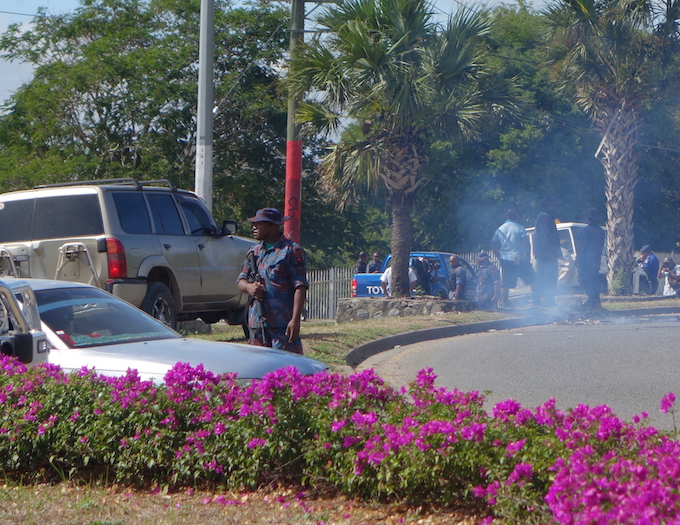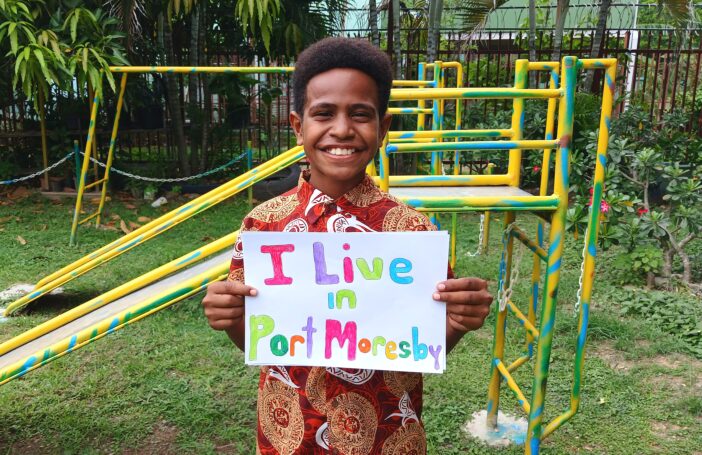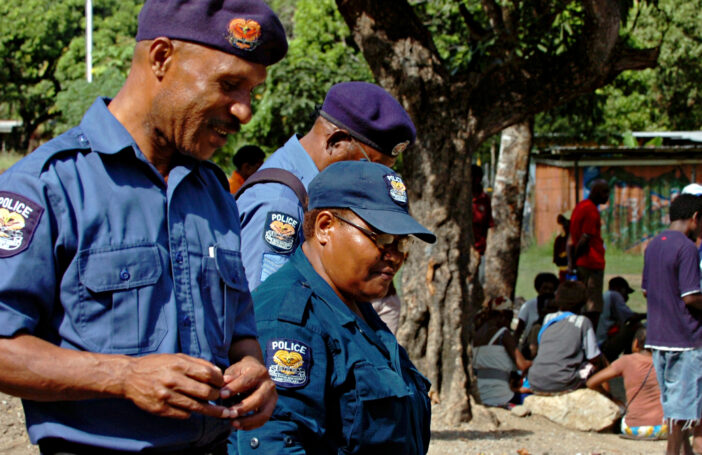The use of force by police and police brutality continue to be a concern to the people of Papua New Guinea (PNG). Police brutality is only perpetrated by a minority of ill-disciplined rogue police officers and does not reflect the mindset of the Royal PNG Constabulary (RPNGC) in its entirety, but it certainly gives the constabulary a bad reputation. It creates distrust of the police by citizens and reflects badly on the PNG government.
This blog gives two examples, one from just last month and one from 2016, to illustrate the fact that police brutality often stems from political influence in policing.
Governor Sir Peter Ipatas versus Laken Lepatu Aigilo
On 18 April 2021, a few police officers attached to the Fox Unit in Port Moresby allegedly forcefully entered Mr Aigilo’s residence at night and assaulted him, and later kidnapped and threatened to kill him before detaining him at the Boroko Police Station. As Mr Aigilo has indicated, this was done without any prior formal complaint lodged against him, and without an arrest or search warrant. He was released the next day after instructions were issued by PNG Police Commissioner David Manning.
A practising lawyer, Mr Aigilo alleges that the police attack raises the question of whether or not police acted impartially or in support of Enga Governor Sir Peter Ipatas against him. This is because Mr Aigilo’s alleged assault and detainment came a day after he formally lodged a complaint with the PNG Ombudsman Commission against Sir Peter over allegations relating to financial mismanagement of the Porgera mine landowners’ royalty payments totalling up to K1.6 billion over a 30-year period.
According to Mr Aigilo, the police involvement in his alleged assault and arrests was politically motivated. Mr Aigilo also alleges that police use of force is an abuse of power and authority because he was unarmed and so there was no need for the use of force by police. He states that his human rights and those of his family were violated.
The case has been registered with the police and will be decided by the courts. While we must await the court’s ruling, the alleged incident certainly brings into question the integrity and independence of the police force.
Police shoot-out at UPNG, 2016
In 2016, students at the University of Papua New Guinea (UPNG) led nationwide protests against Prime Minister Peter O’Neill. Their grievances were many but centred on accountability and the lack of execution of a long-standing corruption charge and arrest warrant against the prime minister.
To quell the protest, armoured police officers went to UPNG and opened fire on unarmed university protestors, injuring several students. The action was viewed by the public as politically motivated in order to protect politicians.
Conclusion
The two cases discussed above demonstrate just some of the reasons that many people believe that police allegiance to politicians contributes to police brutality and the abuse of human rights while in the process protecting political interests. This compromises the constitutional role of police, which is to protect the country’s citizens and their property, and to be impartial between political groupings. Extrajudicial acts by even a few members of the police force undermines citizens’ trust in the state, and leads to significant financial costs to the state in terms of civil litigation.
In order to address issues of police-related violence and brutality linked to political interests, it is crucial for police officers to be educated about their constitutional roles, and the need to adhere to the police Code of Ethics and the Police Act. As is now happening in this most recent case, appropriate disciplinary action needs to be taken against officers who either violate their constitutional roles or take sides when it comes to political interests. Most importantly, politicians need to stop interacting with the police, and stop using them for political reasons. Perhaps then, trust in, and the credibility of, the RPNGC could be restored.






After reposting a service of Al Jazeera on gangs in PNG with the police being just another gang https://bit.ly/pnggangs, and another one the life of a taxi driver in Port Moresby https://bit.ly/pngtaxi, I got a lot of reactions echoing your comment “Police brutality is only perpetrated by a minority of ill-disciplined rogue police officers and does not reflect the mindset of the Royal PNG Constabulary (RPNGC) in its entirety”.
I take issue with the view that it is about a few rogue police officers. First because the frequency and extent of power police abuse suggest otherwise. Secondly, because the police is part of the political system and is being used to neutralize government opponents, the issue is structural. Finally, in my own experience foreign professors were constantly being asked for bribes or other favours with the menace of violence or deportation. In fact, between 2012 and 2018 I was refused entry to the country 4 times, and in 2018 the foreign Vice Chancellor decided to flee before it would come to that point. This is the tip of the iceberg.
I could give numerous examples, but I fear these would be seen as unproven accusations of major corruption of members of the police force, judiciary and the Peter O’Neill government.
Unless structural reform of the police force is undertaken, PNG will continue with law and order issues and many cases of disrespect of human rights and the rule of law.
The matter is not, in most part, due to training, neither the lack of disciplinary actions. Police brutality boils down to leadership and confidence-building in the force – lack of C4 compliance and interoperable synergy amongst the relevant institutional apparatus of the State. Hence, its calls for a collective approach from all key actors. For instance, there must be checks/balances on the leaders in terms of compliance with O.L.D.R.L. The O.L.D.R.L. establishes the specific duties and responsibilities of leaders which the OC as a quasi-judicial/non-judicial body mandated to investigate/ascertain facts and draw conclusions from them as the foundation for official actions against any particular leader, as specified under Section 26 of the Constitution.
Hi Terence and Okole,
Thank you for writing these comments. As to the shooting of the UPNG students on 8 June 2016 with live ammunition, this was an outrage. It is a miracle nobody died, though many students were wounded by ricochet bullets.
At the time I was Vice Chancellor at the PNG University of Technology, where the students were very hard to control. Thanks to the courageous visit to the campus of MetSup Wagambi Jr., we were able to contain the unrest and assure the students stayed on campus. I personally made sure the MetSup would not be attacked by the most hot headed students http://bit.ly/laetensedralbert. This is not normally part of a Vice-Chancellor’s duties.
In the aftermath, PM Peter O’Neill shamelessly demanded an inquiry into the student movement, while the real question of course was who had ordered the special police down to Waigani and ordered them to shoot live ammunition.
Later on 25 October 2018, I was interviewed by ABC and again demanded justice for the students though an independent inquiry https://ab.co/3f3bSxB. In any normal democracy this would not be ignored. I am happy I am no longer a lonely voice in the desert. What a pity that I never received as much as a thank you for putting up with all this nonsense.
Congratulations to you both.
Apart from police alleged to be acting on politicians’ directives, appointments to police hierarchy has been political as well:
O’Neill removed Tom Kulunga for signing the warrant for his arrest. O’Neill then put Geoffrey Vaki in Kulunga’s place. Vaki prevented O’Neill’s arrest. When Vaki was embroiled in a contempt of court order (for preventing O’Neill’s arrest), O’Neill replaced him with Gary Baki. Baki then started vetting high profile cases, including warrant for O’Neill’s arrest.
When O’Neill was replaced in 2019, Baki’s contract was not renewed (he was notified via WhatsApp).
Manning’s appointment has been challenged in court. Police Commissioner is equivalent to Secretary for government departments. Up until this week, the requirement for such position was a tertiary qualification, which Manning didn’t have. This was successfully challenged by candidates who met the requirements but were not given the position.
The government responded by abolishing the Department of Police, and the position for the Secretary for Police. Now that the position for the Secretary is removed, Manning doesn’t need a tertiary qualification to be the Police Commissioner.
The NEC claimed to have acted consistently with the court’s opinion. But what the court stated was, the Department of Police was not created by law, but a 1976 gazette. So the court said if you don’t want someone with tertiary qualifications abolish the Department of Police and the Secretary’s position. At its current form, a police commissioner requires a tertiary qualification.
The NEC then acted on it. Bryan Kramer argued on Facebook that the decision to abolish the Department of Police and Secretary for Police were not illegal. He’s right. But so was O’Neill’s removal of police commissioners, and replacing them at will. O’Neill’s decision were not illegal.
Both O’Neill and Marape have been political in their appointments of Police Commissioners.
So our problem begins right at top.
Hi Michael,
Thank you for those comments.
Yes I agree with you, though NEC have the prerogative to appoint Police Commissioner (and the Departmental heads). However, most of the appointees as you have pointed out in those cases clearly portray that the appointments are purposely to serve political interests and yes Political interference begins at the top.